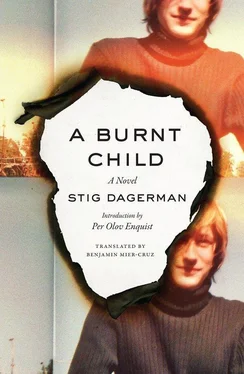But once his chair is extremely close to hers, he realizes how short the distance between love and hate is; they are merely two sides of the same coin. We can only hate the one we truly love, and he does love her because he is close to her. She notices and becomes afraid, afraid of the severity of the law but also afraid of the longing of the flesh. Whenever she was alone in the new, unfamiliar home, she sometimes opened the bookcase and read about this crime as well as all the other crimes. But now she is mostly quivering because she wants him, because she has been longing for him, too.
They both want to, and though they try, they can’t resist. And they can’t resist because they no longer know each other so well. They are once again beautiful strangers to each other.
Your cheeks are so red, she whispers as she looks at him.
She is also red. But it’s foolish of her to have said it, because once you mention something like that, you crave touching it. And to touch him, she had to move closer to him, but she is still a little afraid. Bengt strokes her fur.
Thank you for the bracelet, she whispers.
She isn’t wearing it. He asks why. She says she is too afraid of Knut. Then she reaches for her purse. The bracelet is lying at the bottom of it, and the cigarette case is gone. For a split second, he is grazed by his own hatred. A hot wind strikes his cheek and vanishes in an instant, as wind usually does.
I threw it away, she whispers, for you. Now I have nothing left.
His reason tells him it’s a lie, but he still accepts it as the truth. For we will gladly accept lies as long as they are presented as the truth.
He fastens the bracelet around her wrist. It is heavy and beautiful. And because he doesn’t recognize her wrist, he strokes it. And when they kiss, they do not recognize their lips. Then, when she takes off the fur, they hear Knut’s voice from outside and they go up to the window. Knut and Berit are climbing up the snow. The thermometer reads twenty below zero. They manage to kiss each other one more time before the other two arrive.
Berit is crying when she comes in. Tears, or maybe water, have frozen on her cheeks. Knut is laughing.
She started crying out in the middle of the ice, he says, placing his new hat on the table and taking off his earmuffs. It was different in my day. Then, girls had nothing against sledding. Now we need cars to keep them from crying.
Bengt goes out to the porch alone, and even though it’s twenty below, it feels good to be on the porch. He isn’t cold but simply refreshed. Now the sun is setting, and the glow of winter covers the ice like a thin sheet of red tissue paper. The giant webs of ice on the frozen-in ship are also red. The spider is bleeding and so are the flies. When Berit comes out, he takes her hand.
Poor Berit, he whispers.
She does not ask him why. He doesn’t really know why he said it either. He is merely cheerful and gentle. When tears begin to cloud her eyes, he strokes her with his warm hands, but she continues to cry. Then he leads her to her bed. When they pass the father and Gun’s alcove, he hears them murmuring quietly inside, even laughing a little. But it doesn’t faze him. He only feels calm and peaceful.
As the twilight deepens and grows warm, they sit and talk on the edge of her bed—that is, he talks. She just lies there and listens, but as she listens, her face grows paler and paler. Finally, he asks her if she isn’t feeling well. Then she says that she is ill. But he can tell that isn’t all she has to say, so he asks her to tell the truth.
She asks him if he remembers what day it is. He remembers as soon as she asks. But he doesn’t grow cold, at first. First, he just says that his mother was sweet, and when Berit isn’t satisfied with hearing that, he adds that he had known what day it is. She grows paler.
At the table, the father asks her why she looks so pale. Bengt says it’s because of the cold. Then the father gives her some alcohol to drink because he doesn’t think pale cheeks are beautiful. Then Berit’s cheeks turn a light shade of red, and the father caresses them. As he does this, Bengt and Gun gaze at each other from across the table—joyful and without shame. Their eyes are a little glossy from the alcohol but mostly from joy. Then they suddenly remember all the beautiful things that had happened in the room, but nothing of the ugly things. They also might be feeling a little remorse in front of the ones who don’t have a clue, but this only makes their memories sweeter since remorse is, after all, the best spice of all.
It is all so pleasant for only a moment. On the table there is a candle that has some Christmas wrapping on its base. Gun tosses a box of matches on his lap.
Light the candle, Bengt, she cries.
When he lights the candle, he plans to light it for her and for himself. But that doesn’t happen. It can never happen. Because an image of a candle is already within him, and that image is eternal. Now every time he lights a candle, it will always be this candle he lights. He looks away as soon as he lights it. The father is sitting behind the candle, and there is only one candle the father can sit behind. Bengt takes a sip from his glass, but it doesn’t soothe him. He has to ask. It’s a stupid question—a stupid statement, to be precise.
It’s three o’clock, he says.
Then he feels more intoxicated than he really is. It isn’t three o’clock at all, and he knows it. It is much later. It is six.
No, son, the father says, it’s much later than that.
The father doesn’t remember anything, because reminiscing doesn’t really matter to him. He scarcely cares about what used to be. He only cares about what is.
Is the clock working? Bengt asks.
He didn’t want to mention anything having to do with clocks, but he can’t resist. Shame—or decency, rather—forces him to go on. But the father replies that the clock is certainly working. The key was underneath the armchair, whoever the hell put it there, and they put the head back in its place, freshly gilded. This would have been enough, but when Bengt looks at Berit, he can see that she still isn’t satisfied. He grows irritated with her because he isn’t satisfied himself. So he tells her that she ought to go and lie down, and he grabs her hard by the arm as he usually does when he wants her to understand. She understands and goes.
He feels happier once she is gone, but not entirely. To be as happy as he needs to be, he drinks another glass. They have wine, rum, and aquavit with them. The father is also drinking. And the more he drinks, the more affectionate he becomes. He moves his chair closer to Gun’s and caresses her both above and underneath the table. Bengt moves his chair farther away. All of a sudden, he doesn’t want to see or hear them anymore. But he is not jealous yet. He is only suffering. There is a soiled napkin under the table—scar-let from wine. He picks it up and plays with it for a while. If only everything would just end now, if the candle would go out, if the ice would break up, if Gun would only scream with disgust at the drunken voice that was defiling their stillness. But the candle is in the center of the table and it is burning. It is an ordinary candle yet very brazen.
Then he realizes the candle is not the worst part. Once he realized this, he turns cold. A giant hole emerges from his suffering, and it swells with a shameless chill. Then he gets the urge to torture, to smash things, to tear things down. He destroys all the bars caging his tiger. Then he sics the tiger on the gazelle. He stands up and looks at Gun and his father, but they don’t seem to notice. They are merely carrying on with their endlessly abhorrent behavior. What he noticed then is that Gun, quite simply, isn’t suffering as he is from his father’s drunken caresses. And then what he notices is something dreadful: she actually likes them.
Читать дальше












